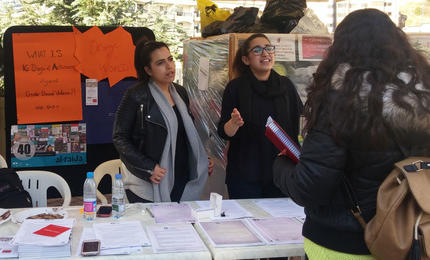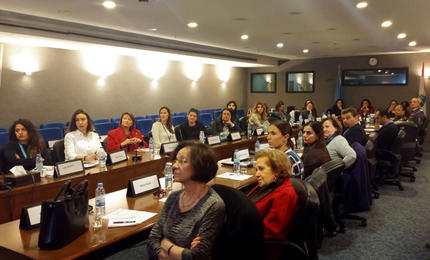Multiple partnerships and initiatives enrich campaign against gender violence
IWSAW participates in talk hosted by ABAAD and UN agencies, celebrates the abolishment of marital rape law and runs video competition, during the 16 Days of Activism campaign.
Every year, LAU’s Institute for Women’s Studies in the Arab World (IWSAW) organizes events, activities and campaigns for the 16 Days of Activism Against Gender-Based Violence. This year was no different. The Institute partnered with UN Women, the ESCWA Centre for Women (ECW) and prominent Lebanese NGO ABAAD on three initiatives that targeted students, experts, NGOs and the media.
An online video competition invited youth from across the Arab region to create short innovative films to highlight gender-based violence. Kourken Papazian, a first year student of film at LAU, won the competition with his video ‘Covering up.’ Papazian was then invited to speak at a discussion held by ESCWA (UN House) in Downtown Beirut which centered around the cost of violence against women in the Arab region, and was moderated by the Director of the Institute Lina Abirafeh. “The talk complemented an ongoing study we are leading together with ESCWA and UN Women,” explained Abirafeh. “Our partnership with them and with ABAAD predates the campaign because our efforts to end violence against women cannot be confined to only 16 days of the year. We are committed to this effort all the time.”
The directors of ABAAD, the Arab Stats office of UN Women and the ESCWA Centre for Women led the discussion with presentations. “The findings presented were startling,” said Associate Social Affairs Officer at the ESCWA Centre for Women Pedro Muñoz Alonso. A study conducted in Egypt last year showed that the estimated annual cost of GBV there amounted to 217 billion Egyptian pounds.
“All the presentations were compelling and very timely, and there was good interaction with the audience,” added Alonso, noting that the four partners have repeatedly worked well together. “We complement each other in expertise and outreach and targeted audience.”
Theatre and music were also on the agenda at an event dedicated to applauding the collective efforts of Lebanese NGOs, the civil society, volunteers, and youths that led to the abolishment of Article 522 which allowed rapists to avoid punishment by marrying their victims.
“This was simply unacceptable, unethical, and a further violation of human rights,” said Abirafeh. “The battle to repeal the law had been fought by the civil society and feminist organizations for a long while and this success is a great victory͟͟͟͟͟͟͟—but one that we should take with caution, because the real work is just beginning.”
In a bid to engage students to understand and join in their efforts, the Institute hosted manned stands at both campuses during the 16 Day Campaign and engaged heavily on social media platforms. Another stand was erected on Corniche-Beirut during an event organized by the European Union, which aimed to engage and raise awareness among citizens.
“By partnering with others—sharing the load of planning and implementation—we expand our support group, and are able to engage with more people by running more initiatives,” said Abirafeh of the many activities and events the Institute was able to hold during the short period of time.
More
Latest Stories
- Into the Psychology of Justice
- Alumnus Zak Kassas on Navigation, Spoofing and the Future of GPS
- Hearing Between the Lines
- LAU Hematology Conference 2025: Advancing Science Through Interdisciplinary Exchange
- Dr. Chaouki T. Abdallah Invested as LAU’s 10th President
- LAU Guides Its Students Through the Code of Conduct
- Innovative Procedure at LAU Medical Center–Rizk Hospital Signals Hope for a Patient With a Congenital Disease
- LAU’s Inaugural PodChat Session Addresses AI Detection in the Classroom



